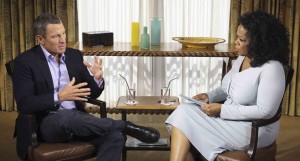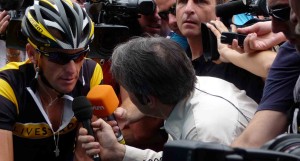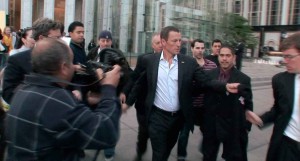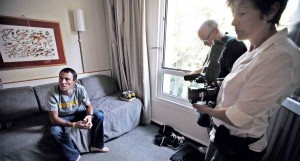Writer: Alex Gibney
Cert: 12
Running time: 122mins
Year: 2013

The lowdown: Oscar-winning director Alex Gibney turns farce into fascination with The Armstrong Lie. Originally a celebratory record of Lance Armstrong’s 2009 return to the Tour de France circuit, it was shelved when doping allegations reared once more and then utterly refocused when the disgraced cyclist admitted he had been illegally enhancing his performance all along. An Icarus like tale of hubris and corruption becomes a story for this “win at all costs” age, where the strong survive and how they became strong is ignored.
The full verdict: Alex Gibney likes focusing on big, problematic personalities. Enron CEO Jeff Skilling in Enron: The Smartest Guys in the Room. Disgraced New York Governor Eliot Spitzer in Client 9. Julian Assange in We Steal Secrets: The Story of Wikileaks.
No surprise then to see him tackling the remarkable story of Lance Armstrong; seven times Tour de France champion, disgraced when he admitted to using performance enhancing drugs after years of denial and vicious legal attacks on his accusers.
Gibney’s original film was to be The Road Back, a sympathetic portrayal of the cyclist’s return to the French race four years after hanging up his vest in 2005.
Gibney is typically candid about the misgivings he had taking on the original project, although admitting he allowed himself to be swept up in the human drama and that a rival film crew also covered Armstrong in order to make an “anti-Gibney film”.
But, Armstrong’s story is one of epic human drama that millions allowed themselves to believe despite overwhelming evidence to the contrary.
A cycling wunderkind who seemed to prove he not only beat testicular cancer, but that it made him stronger when he went on to unprecedented championship success. And who raised hundreds of millions to help cancer victims with his Lance Armstrong Foundation.
But, The Armstrong Lie is really a story of power. And how the adage of absolute power corrupting absolutely forever holds true.
Beyond the cheating, interviews and archive footage depict a man ruthlessly addicted to winning, protecting his image and crushing anyone who questioned his methods, be they journalists or former teammates.
Yet, it becomes apparent that performance enhancement was endemic in professional cycling, with almost every major player implicated at some point, so the playing field may have been more even than it originally seemed.
There is even a Dr Frankenstein character, Michele Ferrari, the team doctor embroiled in rumour and scandal, yet whom Armstrong championed.
Armstrong himself appears in pre and post Oprah interviews, frequently juxtaposed to highlight how convincingly he lived his lie. A man who inspired millions of sick people and raised fortunes for good causes, yet cynically used his charity work as a shield is set against more recent interviews of a fallen hero trying to make sense of his failure.
As the film closes, Armstrong ponders his legacy and it is clear he is still in some way living his lie. Now the whole world can decide for themselves how big it is.
Rob Daniel
[youtube id=”vx3KJn8r8y0″]






Pingback: Rob Daniel Film Reviews and Features – JAN 12 – DEC 13 - Electric Shadows